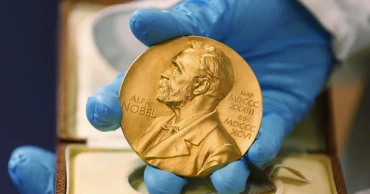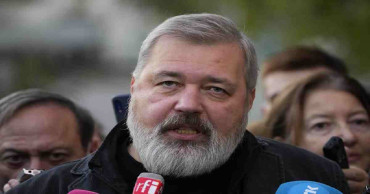Nobel Prizes
5 things to know about the Nobel prizes
The beginning of October means Nobel Prize season. Six days, six prizes, new faces from around the globe added to the world’s most elite roster of scientists, writers, economists and human rights leaders.
This year’s Nobel season kicks off Monday with the medicine award, followed by daily announcements: physics on Tuesday, chemistry on Wednesday and literature on Thursday. The 2022 Nobel Peace Prize will be announced on Friday and the economics award on Oct. 10.
Here are five other things to know about the coveted prizes:
WHO CREATED THE NOBEL PRIZES?
The prizes in medicine, physics, chemistry, literature and peace were established by the will of Alfred Nobel, a wealthy Swedish industrialist and the inventor of dynamite. The first awards were handed out in 1901, five years after Nobel’s death.
Each prize is worth 10 million kronor (nearly $900,000) and will be handed out with a diploma and gold medal on Dec. 10 -- the date of Nobel’s death in 1896.
The economics award — officially known as the Bank of Sweden Prize in Economic Sciences in Memory of Alfred Nobel — wasn’t created by Nobel, but by Sweden’s central bank in 1968.
Between 1901 and 2021, the Nobel Prizes and the prize in economic sciences have been awarded 609 times.
WHO KNOWS WHO WILL WIN AND WHY?
The Nobel statutes prohibit the judges from discussing their deliberations for 50 years. So it’s probably going to be a while before we know for sure how judges made their picks for 2022 and who was on their short lists.
The judges try hard to avoid dropping hints about the winners before the announcements, but sometimes word gets out. Bookies in Europe sometimes offer odds on possible peace prize and literature Nobel winners.
WHO CAN NOMINATE A CANDIDATE?
Thousands of people around the world are eligible to submit nominations for the Nobel Prizes.
They include university professors, lawmakers, previous Nobel laureates and the committee members themselves.
Although the nominations are kept secret for 50 years, those who submit them sometimes announce their suggestions publicly, particularly for the Nobel Peace Prize.
WHAT ABOUT THE NORWEGIAN CONNECTION?
The Nobel Peace Prize is presented in Norway while the other awards are handed out in Sweden. That’s how Alfred Nobel wanted it.
His exact reasons are unclear but during his lifetime Sweden and Norway were joined in a union, which was dissolved in 1905. Sometimes relations have been tense between the Nobel Foundation in Stockholm, which manages the prize money, and the fiercely independent peace prize committee in Oslo.
WHAT DOES IT TAKE TO WIN A NOBEL?
Patience, for one.
Scientists often have to wait decades to have their work recognized by the Nobel judges, who want to make sure that any breakthrough withstands the test of time.
That’s a departure from Nobel’s will, which states that the awards should endow “those who, during the preceding year, shall have conferred the greatest benefit to mankind.” The peace prize committee is the only one that regularly rewards achievements made in the previous year.
According to Nobel’s wishes, that prize should go to “the person who shall have done the most or the best work for fraternity between nations, for the abolition or reduction of standing armies and for the holding and promotion of peace congresses.”
3 years ago
Russian Nobel winner: Peace Prize is for my paper, not me
As editor of Novaya Gazeta, Dmitry Muratov was well aware that his independent Russian newspaper — a persistent critic of the Kremlin, government corruption and human rights abuses in Russia — was seen as a top contender for the Nobel Peace Prize.
But the prestigious award wasn't on his mind when the announcement came down that he'd been named co-winner. At the time Friday, Muratov was absorbed in an argument on the phone with a reporter, Elena Milashina.
“At that time, there were several calls from Oslo. But only a reckless person would say to Milashina ‘Wait, I’ll talk to Oslo and then you and I will quarrel,” Muratov said on Ekho Moskvy radio.
Finally, he was told by his paper's spokeswoman that he had won the 2021 Nobel Peace Prize, along with journalist Maria Ressa of the Philippines, for their fight for freedom of expression in countries where reporters have faced persistent attacks, harassment and even murder.
Read:Journalists from Philippines, Russia get Nobel Peace Prize
The 59-year-old Muratov was similarly casual, even sardonic, about the recognition of the prize that came from the Kremlin spokesman, Dmitry Peskov. In the radio interview, the host asked him for comment on Peskov's statement. Muratov said he hadn't read it and the host offered to read it to him.
“Should I rise?” Muratov said, then heard that Peskov said “he is committed to his ideals, he is talented, he is brave.”
“All the above is certainly true,” Muratov responded.
Other reactions from Kremlin circles were far less generous.
“The Nobel Peace Prize is one of the most controversial nominations of the Nobel Committee. Such decisions devalue the prize itself, it is already difficult to be guided by it,” said Dmitry Kiselev, whose weekly news magazine program on state TV is larded with paeans to Russian President Vladimir Putin and disdain for the opposition.
Considering how critical Novaya Gazeta has been toward Putin and his government, Peskov's congratulatory words could be seen as determined spin-control. They also likely reflect relief that the Norwegian Nobel Committee did not chose another Russian nominee for the Peace Prize — imprisoned opposition leader Alexei Navalny.
Navalny's dramatic arrest this year when he returned from Germany after recuperating from nerve-agent poisoning that he blames on the Kremlin gave him international prominence. Many of his supporters were disappointed that his bravery in confronting Russia's government did not earn him the Nobel.
Lyubov Sobol, one of Navalny's closest and most visible aides, congratulated Muratov on Twitter, but added that she believes Navalny is “the most important fighter for peace in our country.”
Muratov, though pleased by the recognition, agreed.
Read: Tanzanian Abdulrazak Gurnah awarded Nobel literature prize
“I can tell you directly that if I were on the Nobel committee, I would have voted for him for his absolutely crazy courage,” he said.
Novaya Gazeta has courted controversy since its founding in 1993 by Muratov and other former colleagues at the newspaper Komsomolskaya Pravda, the onetime organ of the Communist Youth League. The goal was to create “ an honest, independent, and rich publication that would influence national policy,” according to his citation for the 2007 International Press Freedom Award.
Although the Nobel has brought him intense international attention, Muratov has been at pains to downplay his personal prominence, saying repeatedly that he regards the award as being given to the whole paper and as a tribute to its six reporters or contributors who have been killed.
The most famous victim was Anna Politkovskaya, who reported on Russia's Chechnya wars and was gunned down in the elevator of her Moscow apartment building in 2006. Muratov's Nobel award was announced one day after the 15th anniversary of her killing. Although six people were convicted of involvement in the shooting, whoever ordered it has not been identified and the statute of limitations on the case expired on Thursday.
Yuri Shchekochikhin, a reporter investigating corrupt business deals and the possible role of Russian security services in the 1999 apartment house bombings blamed on Chechen insurgents, died in 2003 of poisoning and the culprits were never found. Anastasia Baburina was shot to death in 2009 after a news conference with a lawyer representing the family of a Chechen girl raped and murdered by a Russian military officer; the lawyer also died in the attack.
The paper and its journalists also have endured an array of threats, ranging from a severed goat's head and funeral notices sent to the paper, to mysterious dustings of powder at the home of a reporter.
Read: Nobel in chemistry honors 'greener' way to build molecules
Prominent investigations at the paper in recent years include reporting on the alleged torture and murders of gay men by Chechen officials, publishing bodycam footage of Russian prison officials torturing an inmate and the beheading of a detainee in Syria by men believed to be Russian mercenaries working for a contractor closely tied to Putin.
The paper's report on the “Blue Whale” phenomenon in which Russian youths reportedly were lured online into committing suicide was criticized as possibly overstated, but a Russian man later claimed to have organized it and was sentenced to prison.
The Nobel Peace award raised concerns about whether it could subject Novaya Gazeta to being designated as a “foreign agent” under Russian law, a term applied to organizations and individuals who receive foreign funding and are engaged in unspecified political activity. The stipulation apparently is aimed at undermining their credibility.
“I hope that this status of Muratov will protect Novaya Gazeta from the status of a foreign agent and will become some kind of protection for Russian journalists, who are massively announced as foreign agents,” said Yevgenia Albats, editor of the Novoye Vremya news magazine. “I hope this will help Russian journalism survive in these difficult conditions.”
But a few hours after the Nobel announcement, the Russian Justice Ministry added nine more journalists and three more organizations to its list of foreign agents.
4 years ago



